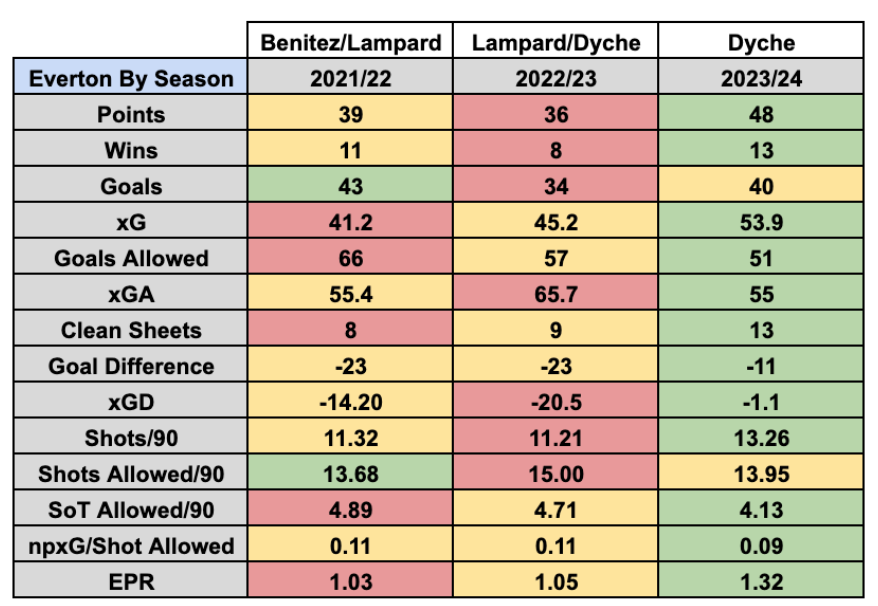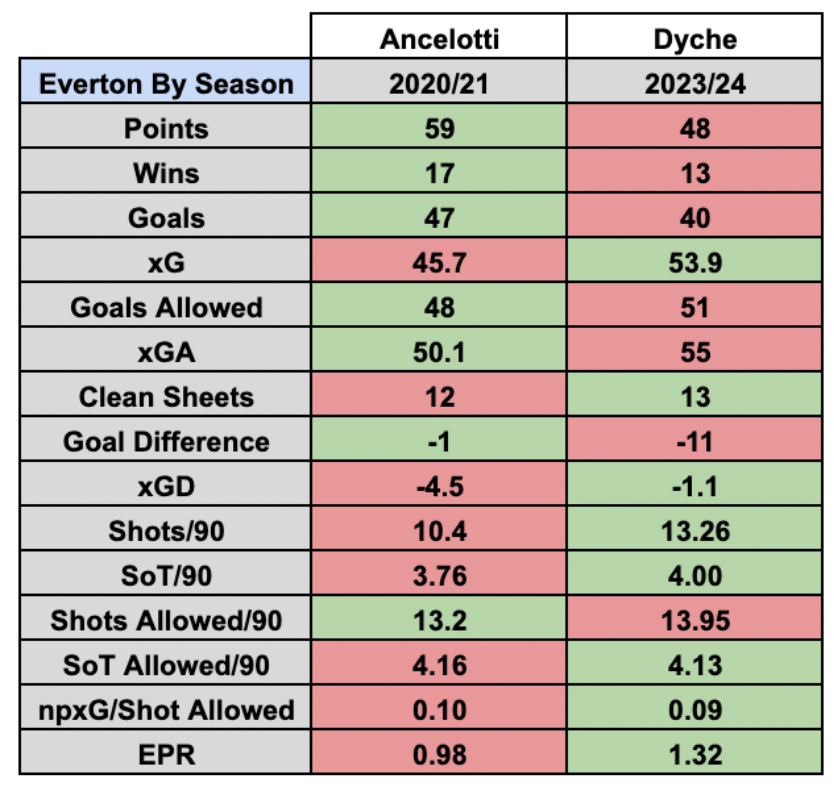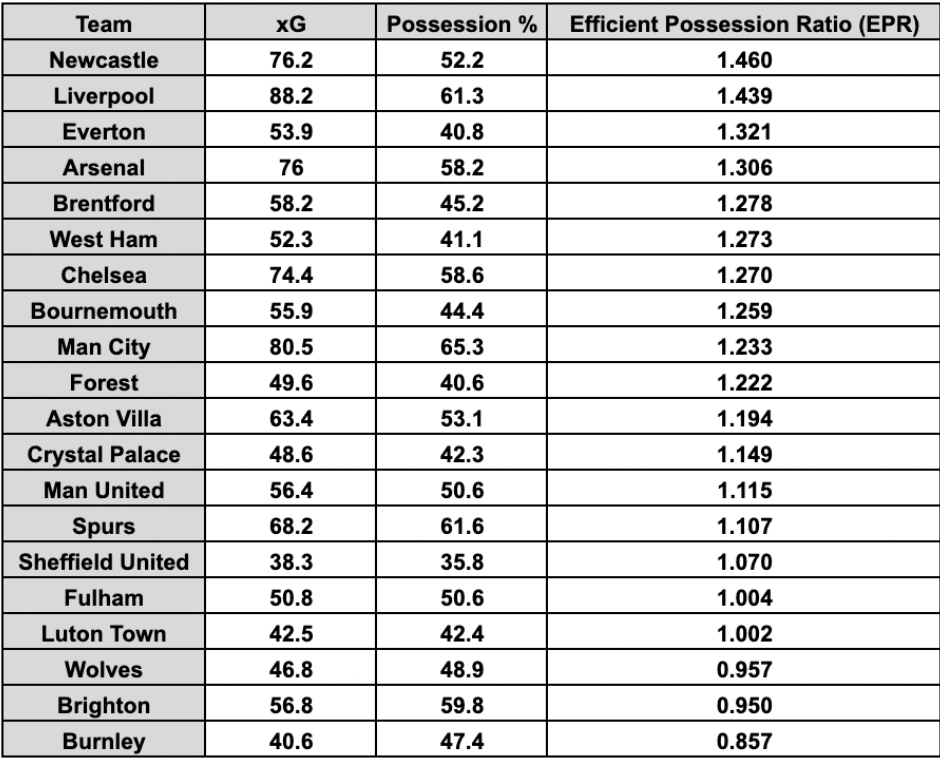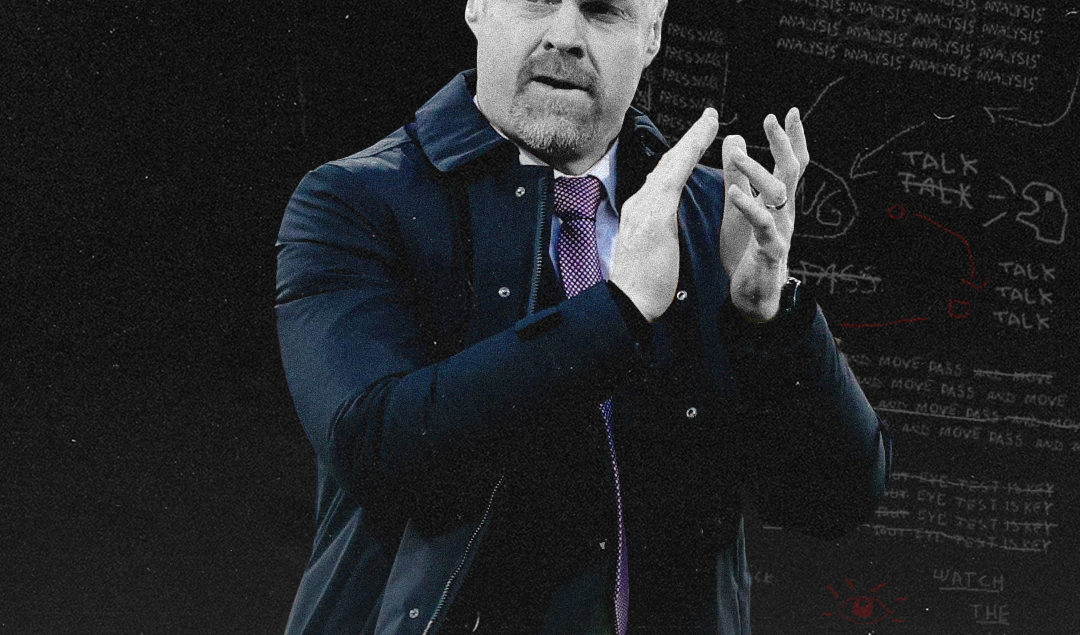Why Sean Dyche Deserves More Credit
Mikel Arteta, Pep Guardiola, Jurgen Klopp, Unai Emery, Andoni Iraola: the five managers nominated for Premier League Manager of the Season and the current vogue of football coaching. I would argue, however, that there is a manager who is just as deserving of that list despite employing a style of football that many would regard as outdated, overly practical, and boring.
Sean Dyche has surpassed all expectations at Everton Football Club this season during what has been a historic year for them for all the wrong reasons. The Kettering native coached through two unprecedented points deductions, injuries, and a host of underperforming players, yet still managed to deliver the Toffees to safety with relative ease and alleviated the seemingly unending stress that has plagued the Goodison faithful for the last few years.
James Tarkowski vs. Liverpool:
-8 clearances
-5 interceptions
-3 tackles
-4/6 ground duels won
-13/17 passes completedEverton have beaten Liverpool at home for the first time since 2010 and dealt the Reds a killer blow to their title charge.@ZachLowy: https://t.co/Tpwi5uE7Ge pic.twitter.com/w76hRSwHtS
— Breaking The Lines (@BTLvid) April 24, 2024
Dyche took the helm on January 30th, 2023 after Frank Lampard was sacked with the club sat in 19th position. FiveThirtyEight’s Premier League Projections gave Everton a league-high 68% chance of relegation at the time of his appointment, and the club had just sold its joint top goalscorer, Anthony Gordon, to Newcastle United in the winter window.
Despite the 40 million odd pounds received for the Finch Farm product, Everton were the only club in the league not to sign a single player that January even though reports indicated that Dyche was promised a few deadline-day incomings upon signing his contract. It seemed that only a series of miracles would keep the Toffees from suffering their first relegation since 1951.
Those miracles came. Dyche started his tenure in the Goodison dugout with a 1-0 win over league leaders Arsenal. Home wins over Leeds and Brentford, a memorable 5-1 upset of Brighton, and Abdoulaye Doucoure’s emotional winning goal on the final day against Bournemouth were all just enough to keep Everton up… barely.
Heading into the 2023/24 season, expectations for Everton remained low. The Blues opened the season with three straight losses, including home defeats to Fulham and Wolves where Dyche’s men bested their opponents, but simply could not find the back of the net. The €25m signing of Beto from Udinese gave the team a bit of hope, but that was the only major signing the Toffees would make in the summer window.
Jarrad Branthwaite vs. Manchester United:
-4/4 ground duels won
-2 tackles
-1/1 dribbles completed
-1/2 aerial duels won
-42/53 passes completed
-1 clearance
-1 foul won@tabuteauS on the Everton CB who’s banging on the door for an England call-up: https://t.co/HYunNipq5u pic.twitter.com/YdWAi1RNcJ— Breaking The Lines (@BTLvid) March 9, 2024
19-year-old Youssef Chermiti also joined for €12.5m from Sporting but only played 208 minutes of league football as the third-choice striker. The loan signings of Jack Harrison and Arnaut Danjuma did bring a bit of a boost to the squad, but just as they began to find some form, the first points deduction hit. The Premier League had imposed a 10-point penalty for a breach of Profit & Sustainability rules, which is a topic for a whole other article.
As a result of that punishment, Everton had just 4 points after 12 matches- a record no team has ever overcome while avoiding the drop. However, instead of the team crumbling under the weight of the largest point-deduction in English top-flight history, they rallied together.
Although Alejandro Garnacho’s Puskas Award contender sparked Manchester United to a 3-0 win at a raucous Goodison Park in the first game after the sanction, Everton won the next four straight, including a 3-0 battering of Newcastle and a 2-0 conquering of Chelsea both under the floodlights at the Grand Old Lady.
A winless spell of 13 games followed, however, and although Everton received 4 of their 10 points back after an appeal in February, an unprecedented second deduction came on April 8th, taking a further two points from the team and leaving them 8 points behind where they should’ve been.
André Gomes was 23 when he joined Barcelona on the back of a European Championship with Portugal.
He was 26 when he saw his Everton career derailed by a severe ankle injury.
At 29, he is enjoying a career revival at Paulo Fonseca’s Lille.@ParrettGost: https://t.co/41ahVHrRgE pic.twitter.com/qPZfqLYU1T
— Breaking The Lines (@BTLvid) March 10, 2023
Dyche’s men did not win a single game between December 16th and April 6th, but when it really came down to it, they showed up in an enormous way. The Toffees won each of their last 5 home games without conceding, the first time they’ve managed that feat since Roberto Martinez’s 2013/14 squad that finished 5th.
The magical run started with a gritty 1-0 win over Vincent Kompany’s Burnley thanks to Dominic Calvert-Lewin’s block of a Muric clearance somehow ending up in the back of the net. Although Cole Palmer’s 4-goal performance delivered Everton a hammering at Stamford Bridge, the team responded with a huge 2-0 win over Forest in a relegation six-pointer a few days later.
They then conjured up a performance for the ages and took down their title-contending neighbors from across Stanley Park in front of a packed Goodison for the first time since 2010. The aforementioned Mikel Arteta was on the pitch wearing a royal blue jersey the last time Everton beat Liverpool in front of a live crowd. A 1-0 win over Brentford the following Saturday sealed the deal and secured Premier League football at Goodison Park for its final season.
So, there’s the narrative, but if that’s not enough to convince you that Dyche belonged in the Manager of the Season race, let’s dive into some numbers. Please note that point deductions have not been factored into these performance-based statistics.

Despite only spending €37.5m on permanent transfers, Dyche delivered a much better season by essentially every metric compared to Benitez and Lampard, who spent €39.5m and €78.2m in their respective summer windows. Those two enjoyed the extra quality of players such as Richarlison, Alex Iwobi, Lucas Digne, Allan, Yerry Mina, and Anthony Gordon, yet were not able to produce anywhere near what Dyche managed this season with a thinner squad of players with less pedigree.
He picked up more points than Roberto Martinez did in two of his three seasons in charge despite the Spaniard having players like Romelu Lukaku, Leighton Baines, and John Stones. Dyche even got close to replicating Ancelotti’s successes during the 2020/21 season, as shown by the stats below.

Although 48 points are significantly fewer than 59, the fact that those 59 points only earned Ancelotti’s Everton 10th place shows that points weren’t exactly hard to come by during that empty-stadium season. The numbers suggest that Dyche’s team was actually more creative than Ancelotti’s in attack, but were let down by their lack of quality in attacking areas.
The problem, however, is that they did not take their chances; something Dyche couldn’t really control. His system set them up to create quality opportunities on the counter and from set pieces, yet the players simply could not put the ball in the back of the net.
Despite creating 53.9 xG, the Toffees scored just 40 goals; a staggering underperformance of 13.9 goals. Since 2017/18, when xG was first tracked in the Premier League, only Fulham’s relegated 2020/21 team has underperformed so greatly in front of goal.
Dyche’s starting #9, Dominic Calvert-Lewin, was the worst in the entire Premier League in terms of conversion having scored just 7 goals from 12.8 xG. He went 18 games without scoring at one point, failing to net from any of his 41 shots during that span.
Amadou Onana vs. Arsenal:
-2 key passes
-4 tackles
-2 interceptions
-8 ball recoveries
-2/3 long balls completed
-5/9 ground duels won
-2/4 aerial duels won
-1 shot@tabuteauS takes a look at Everton’s Belgian midfielder:https://t.co/l06siMidA8 pic.twitter.com/vp5hWwkjMU— Breaking The Lines (@BTLvid) February 4, 2023
His deputy, Beto, wasn’t much better though, finishing 6th worst with -3.8 goals below expected despite playing fewer than 1,000 minutes. Neal Maupay, who was a major culprit in Everton’s inability to score in the first few losses of the season, scored 0 goals from 1.4 xG despite playing just 114 minutes in an Everton kit; the second-worst G-xG/90 in the league behind only Chelsea’s Deivid Washington who played a total of 13 minutes.
Compare this to Benitez and Lampard’s 2021/22 season when Everton’s attackers slightly overperformed in front of goal, and it’s clear just how superior Dyche’s tactics and system really are. Despite the sale of Alex Iwobi in the summer, who led the team in 2022/23 in Assists, Progressive Passes, Key Passes, Passes into the Final Third, Passes into the Penalty Area, Crosses into the Penalty Area, and Shot Creating Actions, the team created 8.7 more xG in 2023/24 than the prior season and 12.7 more than in 2021/22.
Obviously, Benitez and Lampard are not high-quality measuring sticks, but they represent the reality of Everton’s disarray since Ancelotti’s departure. In fact, in the 13 games that Everton met or overperformed their xG, they picked up 11 wins, 2 draws, and fell to only one defeat, meaning when Dyche’s tactics were executed, they worked.
Still not convinced? Well, it’s probably because you think Dyche’s style of play is park-the-bus anti-football which is reminiscent of watching paint dry. You’d be wrong. Although it’s true that Everton played very directly in attack, their efficacy in doing so made them a perpetual threat whenever they had the ball.
One week after exiting the UEFA Europa League to Atalanta, Liverpool’s Premier League title challenge suffered a lethal blow after falling to a 2-0 defeat at Everton.@rabbilnahar on how Liverpool’s title charge came to a grinding halt at Goodison Park: https://t.co/14z5MQaARP pic.twitter.com/u7Xdqjyetc
— Breaking The Lines (@BTLvid) April 26, 2024
Despite having just 40.8% possession on average, the third least in the league, Everton ranked 12th in xG above the likes of West Ham, Fulham, and Crystal Palace, all of who have more attacking talent and are considered more exciting to watch. In order to further illustrate this point, I took the xG of every team and divided it by their average possession. I’m calling this metric the Efficient Possession Ratio, or EPR. You may have noticed it in the tables including above.

As you can see, Everton were one of the most productive teams in the league when adjusted for how much of the ball they had to work with. Although it’s certainly possible to be successful with a lower EPR, as shown by Manchester City, when correlated to the final league position of each team, the r-value of this data set is 0.508 on a scale of -1 to 1.
This means that in general, it is favorable for a team to have a higher EPR. The great thing about this metric though, is that it illustrates how a team attacks. Brighton, for example, are very methodical in their build-up and often favor keeping the ball rather than forcing it forward to create an opportunity.
According to Opta, the Seagulls averaged the second most passes per attacking sequence only behind City, yet didn’t create much more than teams like Bournemouth and Everton who are two of the most direct teams in the league. As a result, their EPR only bettered Vincent Kompany’s Burnley, who are examples of the exact same problem.
Luton Town, on the other hand, also had a low EPR but for a totally different reason. Luton’s 42.4% average possession eclipsed Everton’s 40.8%, Luton attempted fewer long balls than Everton, and Luton kept the ball longer per attack than Everton according to Opta’s direct speed stat. Despite all that, Luton, who were labeled brave and cavalier, created 11.4 less xG than Everton, who were considered negative and defensive despite, in reality, being a team built on solidity and efficiency.
Everton’s last win: October 22.
Everton’s last clean sheet: October 29.
Arsenal’s last league defeat: September 4.
Final score? Everton 1-0 Arsenal.@jpends_ explains why Sean Dyche could be the miracle worker that Everton desperately need right now: https://t.co/4RiFIVEghm pic.twitter.com/KVB0Z4Zh3C
— Breaking The Lines (@BTLvid) February 4, 2023
It is true, however, that the defense was the strength of Dyche’s Everton this season. In a Premier League season that saw more goals than ever before, Everton conceded just 51 of them, the 4th fewest in the league only behind the clubs that finished in the Top 3.
Jordan Pickford kept a second-best 13 clean sheets despite Ashley Young, the walking VAR review himself, making 30 appearances, the most ever by an outfield Everton player aged 38 or over. Should rising star Jarrad Branthwaite remain at the club alongside his compatriots Tarkowski and Pickford in the heart of defense, I see no reason why that solidity will not continue next season.
To conclude, Sean Dyche pulled off an unprecedented escape, if you can even call it that considering the margin of safety. He battled through controversial sporting sanctions, underperforming attackers, few squad reinforcements, and a brutal winless run to deliver Everton back to mid-table comfortability for the first time in several seasons.
Everton have sacked Frank Lampard as manager and replaced him with Sean Dyche, with the Toffees currently languishing in the relegation zone after six losses in their last seven league matches.@PhilTalksFooty analyzes the roots behind Lampard’s sacking:https://t.co/hlPVMm2mru pic.twitter.com/nXahNwn3em
— Breaking The Lines (@BTLvid) January 30, 2023
I’m sure Dyche would’ve valued the Manager of the Season nomination he deserved, but with an ownership change impending and the move to the new stadium at Bramley Moore Dock closing in, the stability that Sean Dyche brought to the blue half of Merseyside this season was truly priceless.
By: Garrett Post / @ParrettGost
Featured Image: @GabFoligno / James Gill – Danehouse / Getty Images
